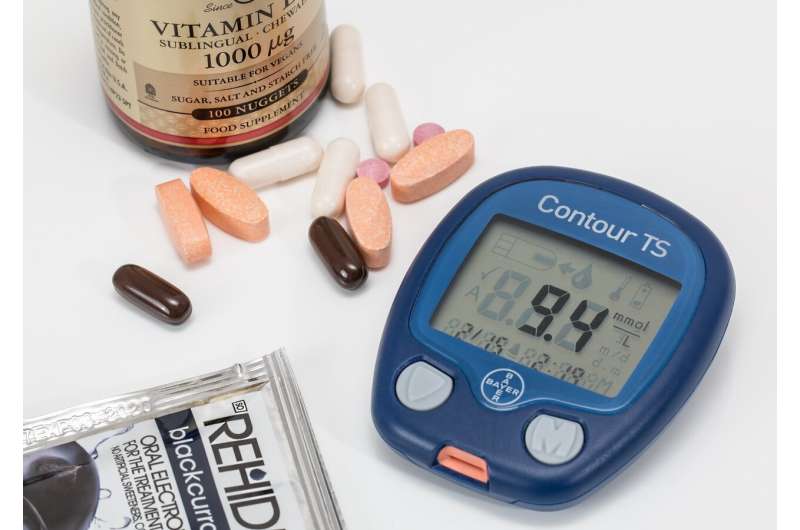A molecule from gut bacteria reduces effect of diabetes medication

The action of metformin, the classic drug used to treat diabetes by stabilizing blood sugar, can be blocked by a molecule from the bacteria in our intestines, a University of Gothenburg study shows.
Metformin is the primary treatment option for type 2 diabetes, but there are major variations in how individuals respond to this drug. In some people it lowers blood glucose (sugar) and delays the course of the disease, while in others its effects are less favorable.
An article published in the journal Cell Metabolism now clarifies one underlying factor that explain why metformin action can be blocked. This blocking is preceded by processes in the gut bacteria—the intestinal microbiota—in which the molecule imidazole propionate is produced.
The change in gut microbiota associated with type 2 diabetes has been demonstrated in previous research under the leadership of Fredrik Bäckhed, Professor of Molecular Medicine at Sahlgrenska Academy, University of Gothenburg.
He has also shown that the altered gut microbiota brings about a change in metabolism of the amino acid histidine. This, in turn, leads to an increase in the production of imidazole propionate, a molecule that inhibits the effects of insulin in lowering blood glucose.
Clear connection with drug efficacy
The present study shows that, besides blocking the effects of insulin, imidazole propionate also reduces the efficacy of metformin in lowering blood glucose. In type 2 diabetes patients, high imidazole propionate levels proved to be associated with impaired metformin action, and vice versa.
The study also shows that imidazole propionate impairs the glucose-lowering effect of metformin in mice.
"Our study demonstrates clearly that imidazole propionate not only inhibits the effects of insulin but may also reduce the therapeutic action of the metformin," Bäckhed says.
"Since imidazole propionate has also been linked to inflammation in the gut, and metformin has several side effects in the form of intestinal problems, it's conceivable that imidazole propionate both blocks the treatment effect and contributes to side effects of metformin. But new studies are needed to verify this hypothesis."
Molecular knowledge and therapies
How imidazole propionate obstructs the efficacy of metformin in regulating blood glucose has been thoroughly investigated through applied biochemistry and molecular biology. Ara Koh is the first author of the study.
"We found out that imidazole propionate interacts with AMPK, the same molecule as metformin. But instead of activating AMPK, imidazole propionate inhibits metformin-induced AMPK activation," she relates.
By blocking another protein, p38gamma, which is required to enable imidazole propionate to block AMPK (AMP-activated protein kinase), the researchers were able to inhibit the effects of imidazole propionate.
The research group works at the Wallenberg Laboratory for Cardiovascular and Metabolic Research at the University of Gothenburg, and the present study was conducted in collaboration with Sahlgrenska University Hospital.
"The work demonstrates the robustness of the translational research carried out at the Wallenberg Lab. There, observations of patients can be explained in molecular terms, which can give rise to new therapies," Fredrik Bäckhed concludes.
More information: Ara Koh et al. Microbial Imidazole Propionate Affects Responses to Metformin through p38γ-Dependent Inhibitory AMPK Phosphorylation, Cell Metabolism (2020). DOI: 10.1016/j.cmet.2020.07.012


















